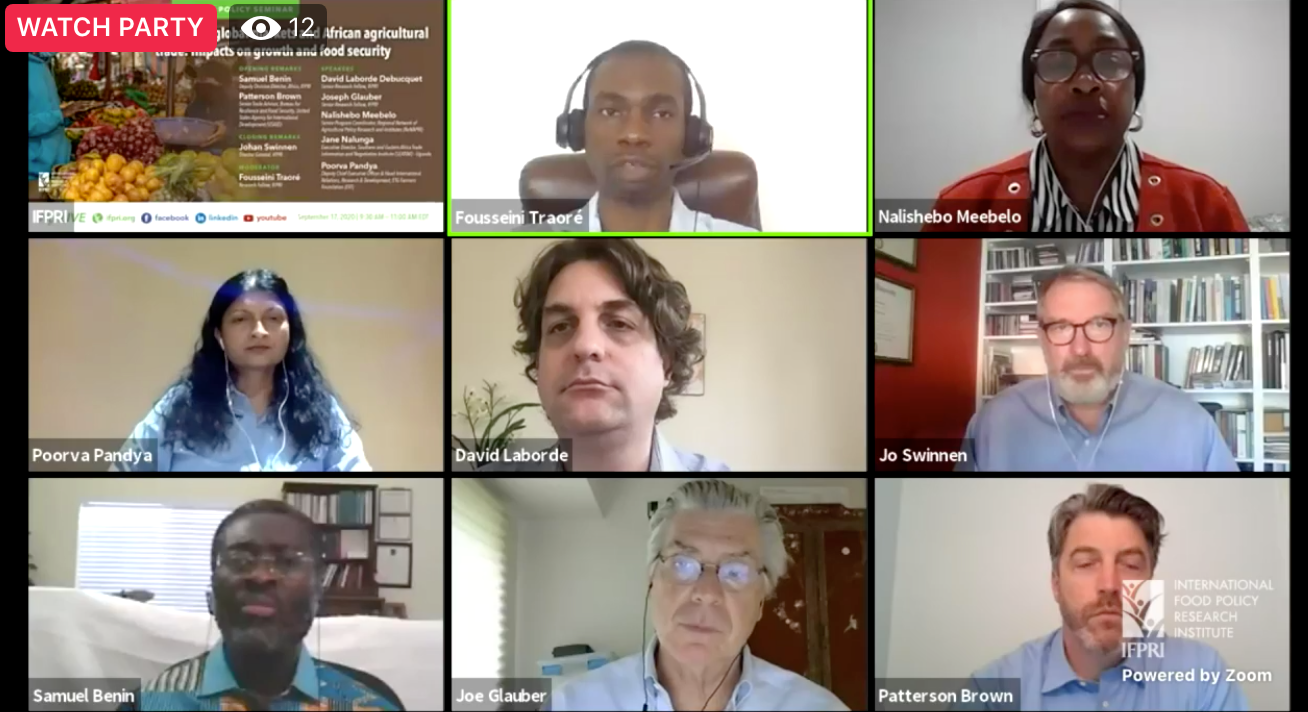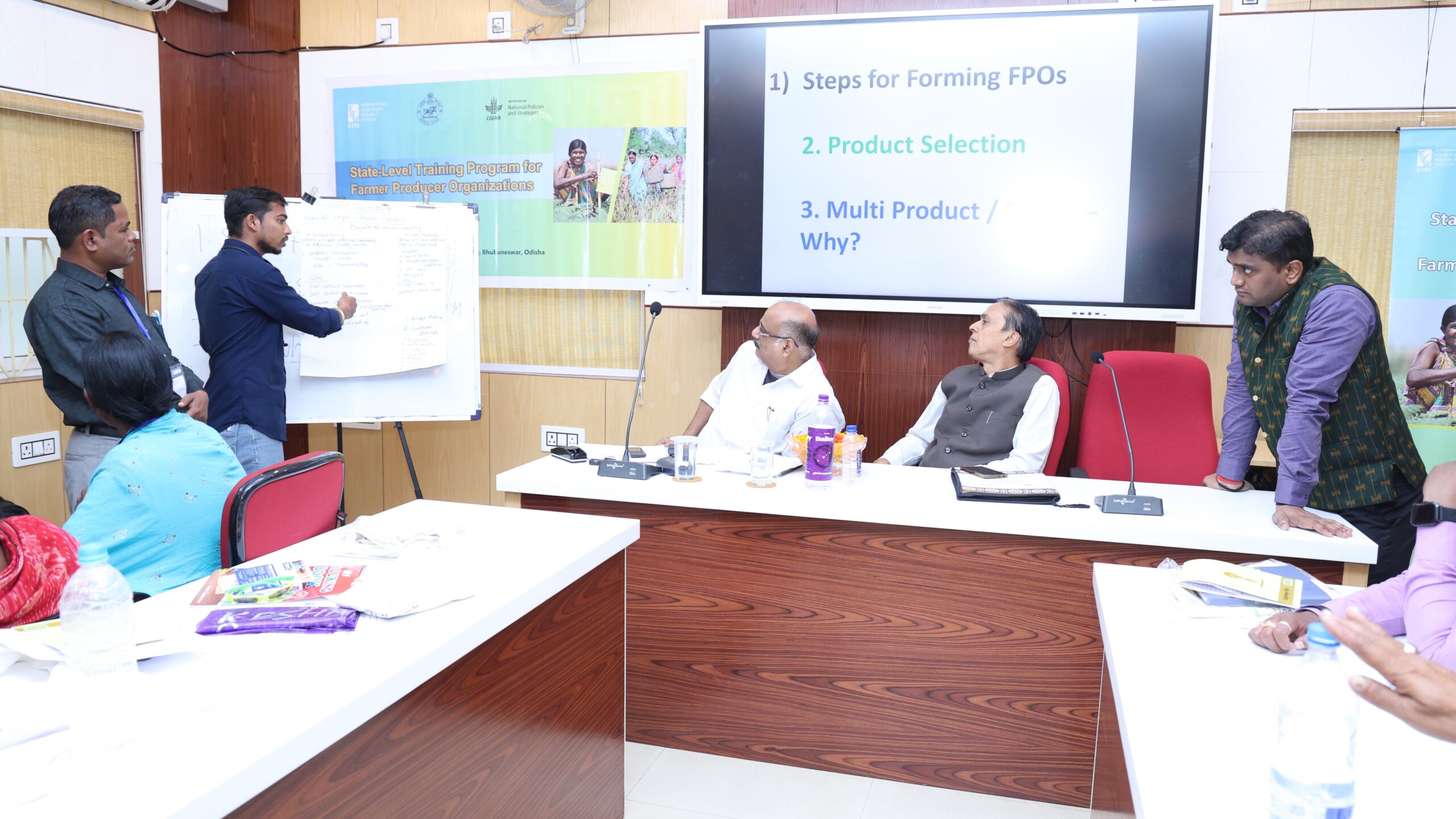The COVID-19 pandemic has crippled a number of African agricultural exports, while dependency on food imports and lower purchasing power across much of the continent threaten to push millions more into food insecurity and poverty. A Sept. 17 IFPRI policy seminar, organized with the support of USAID, explored the interaction of the pandemic’s macroeconomic and microeconomic effects, and how Africa must grapple with global and regional markets in order to recover economically.
Since the onset of the pandemic, USAID Senior Trade Advisor Patterson Brown said, his agency has turned to IFPRI to help track the impact of COVID-19 on markets and trade flows. “We knew this wasn’t something to wait on, based on our experience of 2007-2008 food crisis … which showed us that important trade policy decisions would be happening in real time—and would require real-time information to guide better decisions.”
Such information is all the more important because with COVID-19, Africa is fighting a crisis inside several crises, including the locust outbreak in East Africa, flooding in the Sahel and widespread conflict, said IFPRI Africa Division Deputy Director Samuel Benin.
“With so much of Africa’s population dependent on agricultural exports, any trade disruption has serious consequences for the entire continent,” said Jane Nalunga, Executive Director of the Southern and Eastern Trade Information and Negotiation Institute (SEANTIN) in Uganda.
Nonetheless, all presenters emphasized that the pandemic has had diverse trade impacts across Africa. While food access in Ghana suffered due to a reliance on imported rice and wheat, food availability in Ugandan domestic markets increased, due to closed borders and restricted food exports. Countries highly dependent on oil exports, food imports, tourism, remittances, or other export goods for which demand has plummeted or transportation costs have spiked, are particularly vulnerable, explained IFPRI Senior Research Fellow David Laborde.
The degree of trade disruption varies based on type of product and trading partner, said Poorva Pandya, Deputy Chief Executive Officer and Head of International Relations, Research and Development at the Export Trading Group (ETG) Farmers Foundation. “Shift in demand from countries on global lockdown reduced regional buying power, or higher transportation or input costs have disrupted supply chains, even though farmers have maintained production levels,” she said.
Across its ten African research centers, the Regional Network of Agricultural Policy Institutes (ReNAPRI) has observed lower quality and less food availability because of border closures and restricted trade flows, with food price inflation higher than for other products. Though African production has not (yet) been seriously disrupted, said ReNAPRI Senior Program Coordinator Nalishebo Meebelo, governments recognize that “the pandemic is here for a while.” That means they must develop strategies that enable producers to have continued access to extension services, research and other inputs, so that future regional production can be sustained and grow despite the pandemic, she said.
Unlike the 2008 food crisis, 2020 has not seen global food shortages nor severe export restrictions. Yet high dependence on cereal imports still threatens food security in some countries—particularly in Northern, Southern and West Africa—especially as food index prices have risen. Though the World Trade Organization (WTO) has limited capacity to discourage export restrictions, IFPRI Senior Research Fellow Joseph Glauber explained, it can maintain a transparent information system, and this role communicating export restrictions and global food availability plays a role in calming panic that could incite greater trade protectionism.
ReNAPRI, in partnership with the University of Washington, has been reviewing African policy responses to the pandemic, aiming to provide guidance to countries. Policies must “work for smallholders,” Nalunga said, and they don’t always do that. For example, to address urban food insecurity during the pandemic, Uganda bought food from middlemen, who profited from increased sales, she noted, “but small-scale producers never benefited from the government purchase of food.” Similarly, an online e-voucher food system excluded most small-scale producers.
An questioner from the online audience asked whether import substitution and country-level food self-sufficiency could help Africa cope with trade shocks and increase local resilience. “As with any type of specialization, too much [agricultural] specialization makes one more exposed to risk,” IFPRI’s Laborde said. Other the other hand, regional and global trade connectivity can reduce risk. “Buying food on the global market has been challenging for some countries due to COVID-19, but being self-sufficient will not save you if [your crops] are eaten by locusts,” he said.
Nalunga urged policy makers to undertake extensive coordinated planning in order to maximize the benefits of import substitution and build added value into regional supply chains. “Global price fluctuation of Africa’s raw commodity exports is one of our biggest challenges,” she said. Local jobs that add value to African goods help stabilize incomes by minimizing exposure to global volatility. “But you’re not going to import substitute everything,” Nalunga said. Specialization taps into the comparative advantages of regional agroecological zones, capital or labor specialties. Some countries cannot produce certain foods in environmentally or economically sustainable ways, so it is a question of how governments manage food security and food production risks—regionally and globally pooling, defining and coordinating those risks.
In closing remarks, IFPRI Director General Johan Swinnen said that policy responses to COVID-19 should not supplant longstanding policy recommendations like reducing trade distortions and market inefficiencies, and increasing agricultural investment, education and market access for smallholders. African food and agricultural trade present a promising opportunity to build back better from the pandemic, he said, if governments can mobilize to coordinate effective and equitable trade flows.
Julie Kurtz is a Research Analyst with IFPRI’s Markets, Trade, and Institutions Division.







